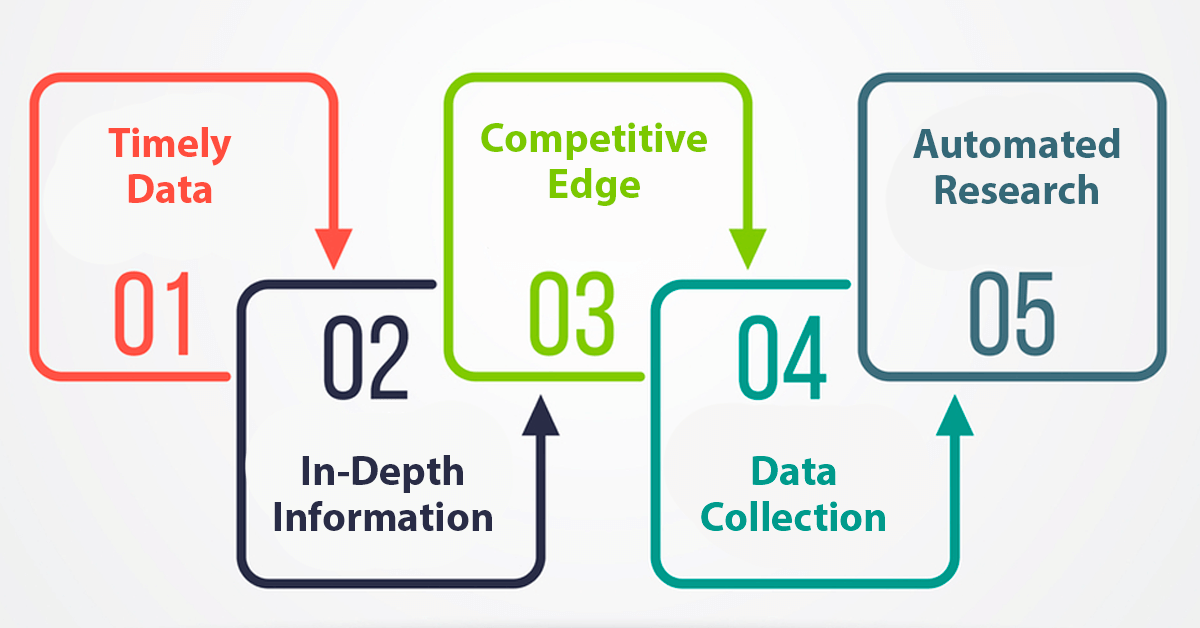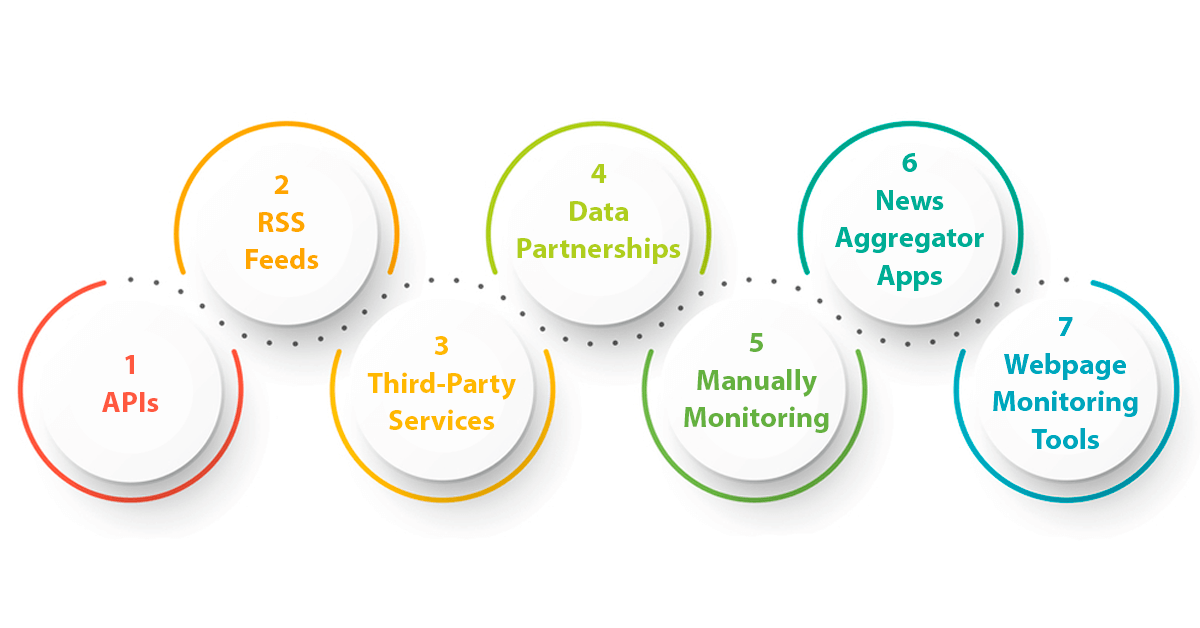
In today's online world, information is everything. With the wealth of online data, extracting and finding specific information, such as the latest news articles, can be invaluable for market research and content aggregation. Financial news especially requires real-time updates, analysis, and immense patience. Bloomberg is a leading source in this domain, offering valuable insights. However, navigating through these articles manually can take too much time. This is where we can use web scraping. Web scraping is a fast and efficient way to gather and analyze data from websites like Bloomberg. In this blog, we will explore how to scrape the latest news articles from Bloomberg, how to use this data ethically and effectively, and why it's pivotal for businesses and data analysts.
What is Bloomberg Data Scraping
Bloomberg data scraping is a way to extract data from Bloomberg automatically. Using technological methods and tools, we can pick out specific information from web pages and save it in an organized way. This makes the data accessible for more analysis or to combine with other data.
Reasons to Scrape Bloomberg Website

Scraping Bloomberg can give you access to a wealth of information that's important for staying informed and making smart decisions in finance and business. Here's why:
- Timely Data - Bloomberg is known for providing the most recent news, which is crucial for making timely financial decisions.
- In-Depth Information - The articles contain detailed analyses of market trends, stock performances, and economic reports that can enhance your research.
- Competitive Edge - By staying updated with the latest finance news, businesses can gain an advantage over competitors who may not have the same level of access.
- Automated Research - Manually tracking the latest news can be overwhelming. Scraping can automate this process, saving time and effort.
- Data Collection - For analysts, having up-to-date news data can help in building models to predict market movements.
In short, scraping Bloomberg can offer a streamlined and efficient way to stay on top of financial news and use that information to your advantage.
Step-By-Step Guide to Scraping Bloomberg Website
To scrape Bloomberg, one should have a basic understanding of the process. It involves a series of steps aimed at extracting, storing, and analyzing the data. Here’s the step-by-step process:
Step 1 - Identify the Content
Start by navigating Bloomberg's website to understand its structure and pinpoint where news articles are located. You'll likely focus on specific sections or categories relevant to your needs.
Step 2 - Check Robots.txt
Verify Bloomberg's robots.txt file (at https://www.bloomberg.com/robots.txt) to ensure the sections you plan to scrape are allowed.
Step 3 - Choose Your Tool
Select a scraping tool that suits your needs based on the complexity of the task and your technical capability.
Step 4 - Write Your Script
Using the chosen tool, write a script to navigate Bloomberg's website, access the articles, and extract the required information. This typically involves:
- Sending a request to the website.
- Parsing the HTML response to find article elements.
- Extracting article data (title, author, publication date, main text).
Step 5 - Run and Test
Execute your script, then refine it based on the output. It's important to test thoroughly to ensure you're capturing data accurately.
Step 6 - Store and Use Data Responsibly
Once you have the data, store it in a structured format for easy access and analysis. Remember to use the data ethically, respecting copyright and data privacy norms.
Alternative Methods to Scrape Latest News Articles from Bloomberg

You have several options if you're looking for alternatives to direct web scraping for obtaining data from Bloomberg. Here's a list of alternatives that respect legal and ethical considerations:
APIs
Check if Bloomberg offers an official API. APIs are designed to provide structured data and are typically a more reliable and legal way to access data, assuming you follow their terms of service.
RSS Feeds
Some websites offer RSS feeds that provide updates on new content. If Bloomberg has such feeds, you can use an RSS reader to collect new articles as they are published automatically
Third-Party Services
There are services and platforms that legally aggregate news from various sources, including Bloomberg. These services may provide an API or data export feature that can be used for analysis.
Data Partnerships
Forming a partnership with Bloomberg or a licensed data distributor might allow you to access the data you need. This is likely a paid option but is also the most reliable and legal one.
Manually Monitoring
If you only need a small amount of data or specific articles, you might manually monitor Bloomberg's news updates and manually collect the necessary data. This is an intensive and not scalable, but it is a simple way to avoid the complexity of web scraping.
News Aggregator Apps
Use existing news aggregator apps with permission to distribute Bloomberg content. You can access a curated list of articles, but this method is more about staying informed than data analysis.
Webpage Monitoring Tools
Use tools designed to monitor webpages for changes and alert you whenever a new article is published. This does not provide data in a structured format but can alert you to new content for manual review.
Some of these alternatives still restrict how the data can be used. Always check Bloomberg's terms of use and obtain proper permissions or licenses when required.
Bloomberg Data Types
In addition to the latest news, Bloomberg provides a wide range of information useful for people working in finance, trading, researching markets, and doing scholarly studies. Here are some of the main types of info you can get from Bloomberg:
Securities Data
Equities
This includes current prices, past
prices, critical numbers used to evaluate the stocks (like
price-to-earnings ratios and dividends), and news about specific
companies.
Fixed Income
This category covers data on
bonds, including government bonds, corporate bonds, and other
debt instruments. It provides information on yields, maturities,
credit ratings, and issuer details.
Currencies
Bloomberg offers real-time and
historical exchange rates for various currency pairs and news
and analysis on global foreign exchange markets.
Commodities
This covers information about
physical goods, like oil, gold, farm products and more. It
details their prices, terms of sale, and expert views on the
market.
Economic Data
Macroeconomic Indicators
This includes
data on key economic indicators like GDP growth, inflation
rates, unemployment rates, interest rates, and consumer
spending.
Industry Data
Bloomberg provides data on
various industries, including sector performance, company
financials, and industry-specific news and analysis.
Government Data
This category offers
access to data released by government agencies, such as
central banks, statistical offices, and regulatory bodies.
Market Data
Market Indices
This includes data on
major stock market indices globally, such as the S&P
500, Dow Jones Industrial Average, and FTSE 100.
Futures and Options
Bloomberg offers
data on futures and options contracts for various asset
classes, including equities, indexes, commodities, and
currencies.
News and Analysis
Bloomberg provides
real-time news articles, research reports, and expert
financial markets and instruments analysis.
Company Data
Company Financials
This includes
detailed financial statements for publicly traded
companies, including income statements, balance
sheets, and cash flow statements.
Company Filings
Bloomberg
provides access to regulatory filings by companies,
including annual reports, quarterly reports, and
other disclosures.
Company News and Events
This
section gives you news stories, official company
announcements, and information about future events
involving certain businesses.
Ethical Considerations While Scraping
Bloomberg
Equities
This includes current prices, past prices, critical numbers used to evaluate the stocks (like price-to-earnings ratios and dividends), and news about specific companies.
Fixed Income
This category covers data on bonds, including government bonds, corporate bonds, and other debt instruments. It provides information on yields, maturities, credit ratings, and issuer details.
Currencies
Bloomberg offers real-time and historical exchange rates for various currency pairs and news and analysis on global foreign exchange markets.
Commodities
This covers information about physical goods, like oil, gold, farm products and more. It details their prices, terms of sale, and expert views on the market.
Macroeconomic Indicators
This includes data on key economic indicators like GDP growth, inflation rates, unemployment rates, interest rates, and consumer spending.
Industry Data
Bloomberg provides data on various industries, including sector performance, company financials, and industry-specific news and analysis.
Government Data
This category offers access to data released by government agencies, such as central banks, statistical offices, and regulatory bodies.
Market Data
Market Indices
This includes data on
major stock market indices globally, such as the S&P
500, Dow Jones Industrial Average, and FTSE 100.
Futures and Options
Bloomberg offers
data on futures and options contracts for various asset
classes, including equities, indexes, commodities, and
currencies.
News and Analysis
Bloomberg provides
real-time news articles, research reports, and expert
financial markets and instruments analysis.
Company Data
Company Financials
This includes
detailed financial statements for publicly traded
companies, including income statements, balance
sheets, and cash flow statements.
Company Filings
Bloomberg
provides access to regulatory filings by companies,
including annual reports, quarterly reports, and
other disclosures.
Company News and Events
This
section gives you news stories, official company
announcements, and information about future events
involving certain businesses.
Ethical Considerations While Scraping
Bloomberg
Market Indices
This includes data on major stock market indices globally, such as the S&P 500, Dow Jones Industrial Average, and FTSE 100.
Futures and Options
Bloomberg offers data on futures and options contracts for various asset classes, including equities, indexes, commodities, and currencies.
News and Analysis
Bloomberg provides real-time news articles, research reports, and expert financial markets and instruments analysis.
Company Financials
This includes detailed financial statements for publicly traded companies, including income statements, balance sheets, and cash flow statements.
Company Filings
Bloomberg provides access to regulatory filings by companies, including annual reports, quarterly reports, and other disclosures.
Company News and Events
This section gives you news stories, official company announcements, and information about future events involving certain businesses.
Ethical Considerations While Scraping Bloomberg
When scraping Bloomberg or another website, following ethical guidelines is important.
- Ensure you understand the rules about collecting data from websites in your area. Check and follow Bloomberg's rules carefully. Most websites have specific clauses about automated access or data extraction.
- Websites use the robots.txt file to define the protocol for web crawlers and scrapers, including off-limits areas. Following these instructions is the right way to gather data from websites.
- Your scraping activities should not overload Bloomberg's servers. It's important to do it when only a few people use the site and not to ask for information too often so you don't stop others from using their service.
- Be careful with the data you collect, especially if it's personal. Think about how you store, handle, and share it with.
- Using data, you've gathered well means not misleading, harmful, or unethical purposes. It also means acknowledging the source of your data and not misrepresenting its accuracy or context.
- If you plan to scrape extensive data, it's best to ask Bloomberg for approval or advice to avoid problems.
Conclusion
Navigating the vast sea of information that Bloomberg offers through scraping can unlock immense value, especially with the right touch of finesse and responsibility. As we underscore the importance of ethical data collection, we also recognize that the complexities can be daunting. This is where Scraping Intelligence shines as your guiding star. As a leading scraping service provider, Scraping Intelligence equips you with the expertise and tools to extract the latest news articles ethically, ensuring you remain at the forefront of information without compromising integrity. Let Scraping Intelligence be the architect of your data collection strategy, turning the intricate task of Bloomberg Web Scraping into a smooth and rewarding journey.
Incredible Solutions After Consultation
- → Industry Specific Expert Opinion
- → Assistance in Data-Driven Decision Making
- → Insights Through Data Analysis







